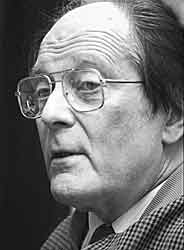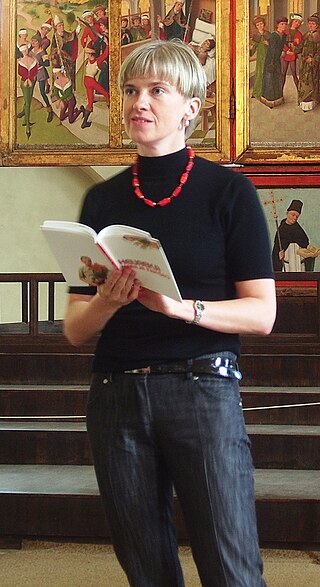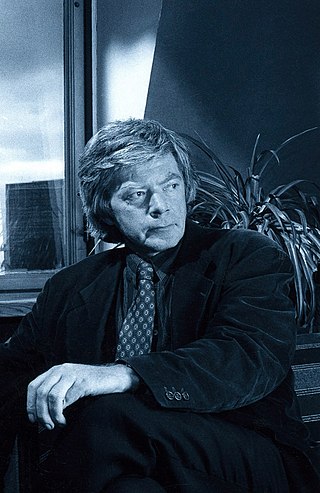Related Research Articles

Tallinn is the capital and most populous city of Estonia. Situated on a bay in north Estonia, on the shore of the Gulf of Finland of the Baltic Sea, Tallinn has a population of about 461,000 and administratively lies in the Harju maakond (county). Tallinn is the main governmental, financial, industrial, and cultural centre of Estonia. It is located 187 km (116 mi) northwest of the country's second largest city, Tartu; however, only 80 km (50 mi) south of Helsinki, Finland, also 320 km (200 mi) west of Saint Petersburg, Russia, 300 km (190 mi) north of Riga, Latvia, and 380 km (240 mi) east of Stockholm, Sweden. From the 13th century until the first half of the 20th century, Tallinn was known in most of the world by variants of its other historical name Reval.

Jaan Kross was an Estonian writer. He won the 1995 International Nonino Prize in Italy.

Marie Under was an Estonian poet. She was nominated for the Nobel Prize in Literature in 12 separate years.
The Estonian Institute is a non-governmental and non-profit organisation based in Tallinn aiming to promote Estonian culture abroad. The institute was founded in 1988/1989 as a shadow foreign office for the Estonian independence movement by Lennart Meri, later first foreign minister and first president of Estonia after their Soviet occupation. Current director of the institute is Katrin Maiste.

Peeter Sauter is an Estonian author, translator and former actor.

Jaak Urmet is an Estonian writer.
Estonian literature is literature written in the Estonian language The domination of Estonia after the Northern Crusades, from the 13th century to 1918 by Germany, Sweden, and Russia resulted in few early written literary works in the Estonian language. The oldest records of written Estonian date from the 13th century. Originates Livoniae in Chronicle of Henry of Livonia contains Estonian place names, words and fragments of sentences. The Liber Census Daniae (1241) contains Estonian place and family names. The earliest extant samples of connected Estonian are the so-called Kullamaa prayers dating from 1524 and 1528. The first known printed book is a bilingual German-Estonian translation of the Lutheran catechism by S.Wanradt and J. Koell (1535). For the use of priests an Estonian grammar was printed in German in 1637. The New Testament was translated into southern Estonian in 1686. The two dialects were united by Anton Thor Helle in a form based on northern Estonian. Writings in Estonian became more significant in the 19th century during the Estophile Enlightenment Period (1750–1840).
Arvo Antonovich Mets was an Estonian-born Russian poet. He is regarded as a master of Russian free verse. He also translated works of Estonian poets into Russian.

Karl Martin Sinijärv is an Estonian journalist and poet.
Kersti Merilaas was an Estonian poet and translator. In addition, she wrote poems and prose for children and plays.

Tarmo Teder is an Estonian writer, poet and critic.
Looming is the oldest literary magazine in Estonia. The headquarters is in Tallinn.

Maarja Kangro is an Estonian poet, short story writer, novelist, essayist, nonfiction writer and librettist.

Meelis Friedenthal is an Estonian academic and writer.

Kalle Kurg is an Estonian poet, writer, critic, translator and editor. As a versatile figure in Estonian culture, he has also published caricatures and worked as a theatre director.
Maie Kalda was an Estonian literary scholar and critic.

Mati Sirkel is an Estonian translator and writer.

Andra Teede is an Estonian poet and dramaturge.
Marta Sillaots, born Marta Reichenbach was an Estonian writer, translator, and literary critic.
Veronika Kivisilla is an Estonian poet and literary critic, possibly best known for her publications Kallis kalender (2011), Cantus Firmus (2015), Kuni armastus peale tuleb (2018), and Salutatio (2019).
References
- 1 2 3 "New Estonian Literary Magazine Out". Err. 17 September 2013. Retrieved 18 December 2014.
- ↑ Neil Taylor (15 December 2006). Tallinn. Bradt Travel Guides. p. 204. ISBN 978-1-84162-179-1 . Retrieved 18 December 2014.
- ↑ "Estonian Literary Magazine". Esti Instituut. Retrieved 18 December 2014.